
The Zimúrán script was created by TJ for his conlang Zimúrán, a language spoken supposedly by the mutants that live in the forests of Zimúrá on the northern boundaries of the world, where Alexander, a conquestador, wars with them. Zimúrán is a recording system composed mainly of knots and threads, and not used for communication, and are used merely to pronounce names, properties and so on.

Zimúrán is a semi-syllabic system with only 3 vowels, and each vowel has a short and a long form. The system consists of 8 consonants divided into 2 main categories, light and hard. In the hard form, threads made up from animal coats (fur, hair..etc) are used, while for the light form threads are made from plant fibers. In the schematic form (where writing on a paper is involved), the light form is differentiated by changing the color of the line or putting a special mark on the side of the consonant. The hard form is considered the basic form and the light form is considered secondary.
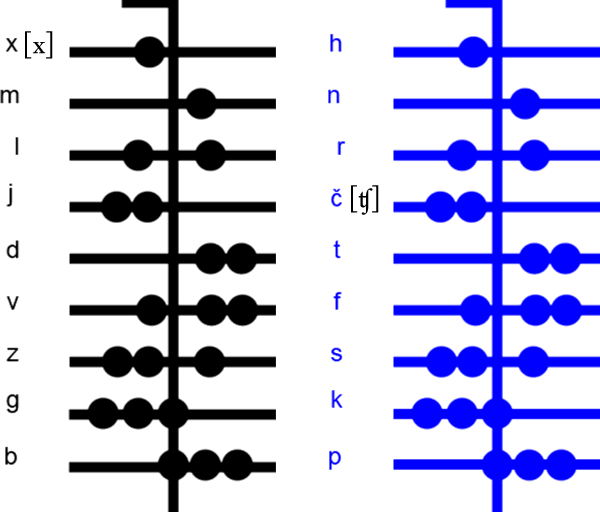
The vowels are formed on the same thread of the consonant. On the side of every consonant, the vowels are formed (if required) by dismantling the side of the thread into 3, 2 or 1 component. If the vowel is to come alone with no consonants preceeding, the side of a plain thread is dismantled. The left side is usually dismantled, and in case of longer vowels, both sides of the thread are dismantled.
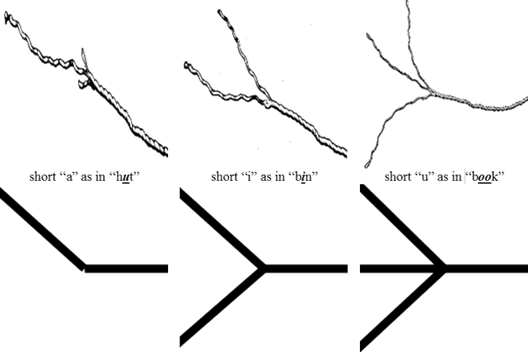
The direction of reading is top to bottom, with the top having a special starting thread pointing to the left side.
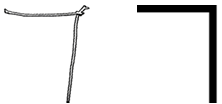
If there are several words to be knotted, then all words would be tied on a single long horizontal thread, while words hang from it (like vines) and reading would be left to right, top to bottom for every word.
Numbers are tied using the basic form (animal threads, or other basic type if the knotter wishes to).
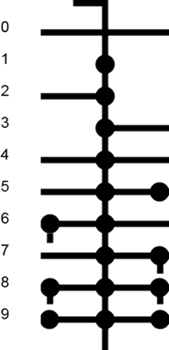
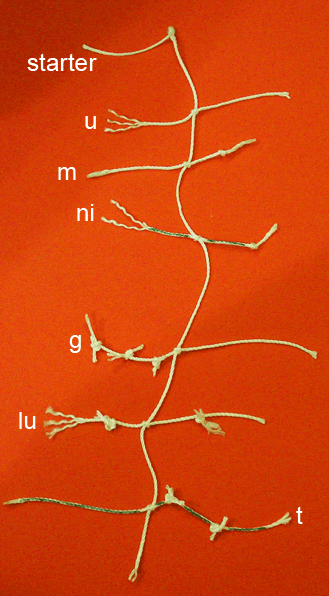
Notice the green color on some threads to mark light forms.
If you have any questions about Zimúrán, you can contact TJ at: ayvarith@gmail.com
Ayvarith, Betenic, Bulughman, Zimúrán
Constructed scripts for: Ainu | Arabic | Chinese languages | Dutch | English | Hawaiian | Hungarian | Japanese | Korean | Lingala | Malay & Indonesian | Persian | Tagalog / Filipino | Russian | Sanskrit | Spanish | Taino | Turkish | Vietnamese | Welsh | Other natural languages | Colour-based scripts | Tactile scripts | Phonetic/universal scripts | Constructed scripts for constructed languages | Adaptations of existing alphabets | Fictional alphabets | Magical alphabets | A-Z index | How to submit a constructed script
[top]
You can support this site by Buying Me A Coffee, and if you like what you see on this page, you can use the buttons below to share it with people you know.

If you like this site and find it useful, you can support it by making a donation via PayPal or Patreon, or by contributing in other ways. Omniglot is how I make my living.
Note: all links on this site to Amazon.com, Amazon.co.uk
and Amazon.fr
are affiliate links. This means I earn a commission if you click on any of them and buy something. So by clicking on these links you can help to support this site.
[top]